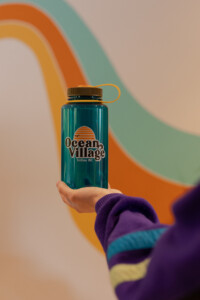See You Later, Single-Use!
The District of Tofino takes steps to support green travel with recent action to ban single-use plastic water bottles.
The recent amendment proposal will soon include “Plastic water bottle 1 Litre and Less”, adding to the list of prohibited items which includes:
- Checkout Bag
- Plastic Drinking Straw
- Polystyrene Foam Food Service Ware for Prepared Foods
- Single-Use Plastic Utensils
This is a strong push to achieve a higher level of sustainable tourism. In support of this initiative, we encourage Ocean Village guests to bring a reusable water bottle and, as always, your trusty to-go mug. Didn’t bring one from home? We’ve got you covered with our array of double-walled coffee mugs and freshly-branded Nalgene bottles.

At times of the year when we need to be more water-conscious, the restriction will pause to reduce pressures on the summer water supply.
In the past few decades, the world has experienced an exponential rise in plastic production, leading to a concerning proliferation of single-
use plastics. From shopping bags to water bottles, straws to food packaging, these disposable items have become an integral part of our daily lives. However, their convenience comes at a steep environmental cost.
The impact of single-use plastic on the environment is staggering. These items often end up in landfills, where they take hundreds of years to decompose, releasing harmful toxins into the soil and water. Birds, fish, and other sea creatures often mistake plastic debris for food, leading to ingestion and entanglement, with devastating consequences for their health and well-being.
Discover the many ways we aim to reduce our footprint at Ocean Village:
https://oceanvillageresort.com/2023/06/13/crazy-bout-conservation/
Beyond the immediate environmental consequences, the production and disposal of single-use plastics also contribute significantly to greenhouse gas emissions and climate change. The extraction of fossil fuels required to produce plastic, as well as the energy-intensive manufacturing processes, release large quantities of carbon dioxide into the atmosphere. Incinerating plastic waste generates toxic emissions, further exacerbating air pollution and its associated health risks.
To mitigate these pressing environmental issues, reducing single-use plastic consumption is imperative. By embracing reusable alternatives and adopting sustainable practices, individuals, businesses, and governments can collectively make a tangible difference. Here are some compelling reasons why reducing single-use plastic is crucial:
- Protecting Marine Life: By reducing the amount of plastic waste entering our oceans, we can safeguard marine ecosystems and protect vulnerable species from harm.
- Preserving Natural Resources: Plastic production relies heavily on finite fossil fuels, contributing to resource depletion and environmental degradation. Reducing plastic consumption conserves valuable resources and minimizes environmental impact.
- Mitigating Pollution: Single-use plastics not only clutter landscapes and waterways but also contribute to pollution through the release of toxic chemicals. By reducing plastic usage, we can mitigate pollution and create cleaner, healthier environments for all living beings.
- Combatting Climate Change: The production, transportation, and disposal of plastic generate significant greenhouse gas emissions. By reducing single-use plastic, we can lower our carbon footprint and contribute to global efforts to combat climate change.
- Promoting Innovation: Embracing alternatives to single-use plastic encourages innovation in materials science and product design. From biodegradable plastics to reusable packaging solutions, sustainable alternatives are driving positive change in the marketplace.
Individual actions, no matter how small, can collectively have a profound impact on the environment. By making conscious choices to reduce single-use plastic consumption in our daily lives and while we travel, we can contribute to a more sustainable future for generations to come. Whether it’s opting for reusable shopping bags, using refillable water bottles, or supporting businesses that prioritize eco-friendly practices, every effort counts.
Read the Tofino-Ucluelet Westerly News article about the ban:
Straight to the source:
- “District of Tofino Single-Use Item Regulation Bylaw No. 1277, 2020”
- March 12, 2024 Council Meeting Agenda – “District of Tofino Single-Use Item Regulation Amendment Bylaw No.1277.02, 2024”


